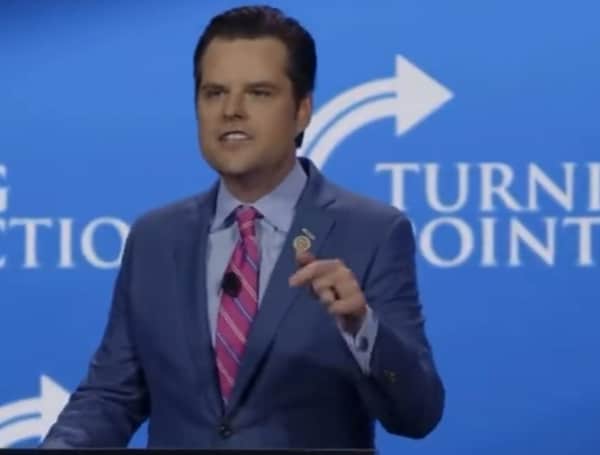U.S. Congressman Matt Gaetz (R-FL) will introduce the “National Prayer in School Act.” This legislation, if passed, will allow students and staff to pray in school without fear of repercussion if they choose to engage.
Gaetz announced that he intended to introduce the legislation at Turning Point Action’s 2023 Action Conference in July.
“The limitations of man and God’s reach does not stop at the school house gates. In the coming days, I will introduce a national prayer in school law so that in every classroom in America, there will be time for students to pray if they choose.” Gaetz said at the conference. “And you know what? This beautiful new supreme court that President Trump gave us, just might uphold a constitutional law like that based on the values that this country was built on.”
In the news: Rep. Matt Gaetz, Colleagues Demand Speaker McCarthy Launch Select Committee On UAPs
In June 2022, the United States Supreme Court ruled in favor of religious freedom and sided with a football coach who was fired by his school district for embracing his First Amendment right before games. Rep. Gaetz’s legislation will enforce the Supreme Court’s ruling to allow every person the ability to engage in prayer in school.
“God’s reach does not stop at the schoolhouse gates. Our country’s education policy forbids students and faculty from praying while endlessly promoting degenerate LGBT and anti-White propaganda,” said Gaetz. My legislation unlocks religious freedom once again so that in every classroom in America, there will be time for students to pray if they choose.”
The bill states, “Every person who, under color of any statute, ordinance, regulation, custom, or usage, subjects, or causes to be subjected, any citizen of the United States or other person within the jurisdiction thereof to any limitation on the ability of that person to engage in prayer in any school shall be liable to the party injured in an action at law, suit in equity, or other proper proceeding for redress, except that in any action brought against a judicial officer for an act or omission taken in such officer’s judicial capacity, injunctive relief shall not be granted unless a declaratory decree was violated or declaratory relief was unavailable.”
The history of prayer in schools in the United States is a long and complex one.
In the news: Comer Releases 3rd Bank Memo Showing Payments To The Bidens From Russia, Kazakhstan, And Ukraine
In the early days of public education, prayer was a common practice in schools. Teachers would lead students in prayer, and the Bible was often read aloud in class. This practice was seen as a way to promote morality and good character in students.
However, there was increasing opposition to school prayer. Some people argued that school prayer violated the First Amendment to the U.S. Constitution, which guarantees the freedom of religion. They argued that school prayer forced students to participate in religious activities, even if they did not believe in the religion being promoted.
In 1962, the Supreme Court ruled in the case of Engel v. Vitale that school-sponsored prayer in public schools was unconstitutional. The Court ruled that school prayer violated the Establishment Clause of the First Amendment, which prohibits the government from establishing a religion.
The Supreme Court’s decision in Engel v. Vitale was a major blow to school prayer advocates.
However, they did not give up. In 1963, the Court ruled in the case of Abington School District v. Schempp that Bible reading in public schools was also unconstitutional. The Court ruled that Bible reading in public schools violated the Establishment Clause, as it promoted the Christian religion.
The Supreme Court’s decisions in Engel v. Vitale and Abington School District v. Schempp effectively ended school prayer in the United States.
However, the issue of prayer in school continues to be debated today. Some people believe that school prayer should be allowed, while others believe that it violates the First Amendment.
In recent years, there have been some attempts to bring prayer back into public schools. In 2000, the Supreme Court ruled in the case of Santa Fe Independent School District v. Doe that student-led prayer at school events was permissible, as long as it was voluntary and non-coercive.
However, the Court also ruled that school officials could not endorse or promote the prayer.
Android Users, Click To Download The Free Press App And Never Miss A Story. Follow Us On Facebook and Twitter. Signup for our free newsletter.
We can’t do this without your help; visit our GiveSendGo page and donate any dollar amount; every penny helps

